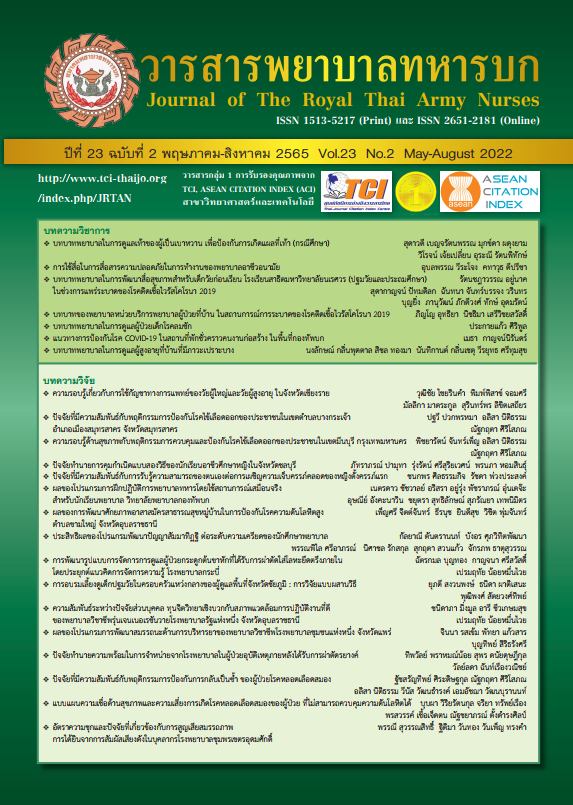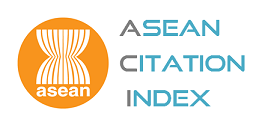ผลของโปรแกรมการฝึกปฏิบัติการพยาบาลทหารโดยใช้สถานการณ์เสมือนจริง สำหรับนักเรียนพยาบาล วิทยาลัยพยาบาลกองทัพบก
คำสำคัญ:
การพยาบาลทหาร, การสอนโดยใช้สถานการณ์เสมือนจริง, ความมั่นใจ, บทบาทพยาบาลทหารบก, ความพึงพอใจบทคัดย่อ
การวิจัยนี้มีวัตถุประสงค์ เพื่อศึกษาผลของโปรแกรมการฝึกปฏิบัติการพยาบาลทหารโดยใช้สถานการณ์เสมือนจริง ต่อความรู้ด้านการพยาบาลทหาร ความมั่นใจในการปฏิบัติบทบาทพยาบาลทหารบก ทักษะการจัดการในบทบาทพยาบาลทหารบก และความพึงพอใจต่อการจัดการเรียนการสอนในนักเรียนพยาบาลกองทัพบกชั้นปีที่ 4 จำนวน 100 คน เครื่องมือที่ใช้ คือ 1) แบบ วัดความรู้ด้านการพยาบาลทหาร 2) แบบสอบถามความมั่นใจในการปฏิบัติบทบาทพยาบาลทหารบก 3) แบบประเมินทักษะ การจัดการในบทบาทพยาบาลทหารบก และ 4) แบบสอบถามความพึงพอใจ สถิติที่ใช้ ได้แก่ ค่าเฉลี่ย ส่วนเบี่ยงเบนมาตรฐาน และการทดสอบค่าที
ผลวิจัยพบว่า หลังได้รับการจัดการเรียนการสอนด้วยโปรแกรมการฝึกปฏิบัติการพยาบาลทหารโดยใช้สถานการณ์ เสมือนจริง กลุ่มตัวอย่างมีคะแนนเฉลี่ยของความรู้ด้านการพยาบาลทหาร ความมั่นใจในการปฏิบัติบทบาทพยาบาลทหารบก สูงกว่าก่อนได้รับโปรแกรมการฝึกอย่างมีนัยสำคัญทางสถิติ มีทักษะการจัดการในบทบาทพยาบาลทหารบกอยู่ในระดับดี และมีความ พึงพอใจต่อโปรแกรมการฝึกอยู่ในระดับดีมาก
Downloads
เอกสารอ้างอิง
The Royal Thai Army Nursing College. Students’ manual, Bachelor of Nursing Science Program. 2020; 27-37. (in Thai)
Saowapa W. Learners’ Learning Styles: The Perspectives from the Theory of Experiential Learning. Executive Journal:175-80. (in Thai)
Thamnamsin K, Punyapet K, Noitung S, Artsanthia J. The Effect of Teaching Simulation-Based Learning Program to The Knowledge in Basic Medical Care of Nursing students. Journal of The Royal Thai Army Nurses. 2018;19:80-8. (in Thai)
Wisawatapnimit P, Suttineam U, Teerawatskul S. Effects of simulation-based learning for nursing practicum preparedness for patients with shock on students’ satisfaction, selfconfidence in learning, and clinical judgment of nursing students. Journal of health science research. 2020;14(3):59-70. (in Thai)
Chompoopan W, Chompoopan W, Chanaboon A, Seedaket S, Yomseeken J. Effects of a simulation-based learning model for medical management of patients with cardiovascular diseases. Nursing Journal of the Ministry of Public Health. 2020;30(2):93–103. (in Thai)
Naruponjirakul S. Enhancement of Thai Graduates’ Employability Skills using Scenario-Based Learning. Proceedings of the 14th international conference, Digital Technology for Sustainable Wellbeing and Smart Society; 2020 May; Dhurakij Pundit University. 300-10. (in Thai)
Thaiudom A, meeparn A, Untaja P, Yuroong A, Bohplian S, Ankanawin U, Chutchawan N. The Intregrated Training Program for Mass Casualty and Disaster Nursing Management. Journal of The Royal Thai Army Nurses. 2018;19(3):77–88. (in Thai)
Chutchawan N, Untaja P, Yuroong A, Ankanawin, U, Sutthilak, C, Thepnimit S. The developmentof Army Nurses’ Competencies by using scenario-based training. Journal of The Royal Thai Army Nurses. 2020;21(2): 53-62. (in Thai)
Jeffries PR. A framework for designing, implementing, and evaluating simulations used as teaching strategies in nursing. Nuring Educ Perspect. 2005;26(2):96-103.
Ma H, Lin L, Zhang S, Lei L, Huang J, Fang Lu, et al. Exploring competencies of military nurses in general hospitals in China: a qualitative content analysis. BMC Nursing. 2021;20:1-8.
Wuttisakpisarn S, Chudjuajeen S, Taonoi K. Effects of high-fidelity simulation-based learning for preparation of practice on knowledge, satisfaction, and self-confidence of nursing students. Journal of Health Science research. 2020;14(2):70-81. (in Thai)
James JF. Use of High-Fidelity Simulation to Improve Confidence in Military Nurses’ Deployment Readiness [Dissertation]. Rhode Island College; 2021.
Sanitsom P, Jarat N. Military leadership attributes for Royal Thai Armed Force. Executive Journal. 2015;35(1):75-86. (in Thai)
Samrannet W, Korissaranuphab N. Satisfaction of Simulation-Based Learning in Nursing Care for Patients with Shock among nursing students in Srimahasarakham Nursing College. Journal of Sakon Nakhon Hospital. 2019;22(1):64-75. (in Thai)
ดาวน์โหลด
เผยแพร่แล้ว
รูปแบบการอ้างอิง
ฉบับ
ประเภทบทความ
สัญญาอนุญาต
ลิขสิทธิ์ (c) 2022 วารสารพยาบาลทหารบก

อนุญาตภายใต้เงื่อนไข Creative Commons Attribution-NonCommercial 4.0 International License.
บทความหรือข้อคิดเห็นใดใดที่ปรากฏในวารสารพยาบาลทหารบกเป็นวรรณกรรมของผู้เขียน ซึ่งบรรณาธิการหรือสมาคมพยาบาลทหารบก ไม่จำเป็นต้องเห็นด้วย
บทความที่ได้รับการตีพิมพ์เป็นลิขสิทธิ์ของวารสารพยาบาลทหารบก
The ideas and opinions expressed in the Journal of The Royal Thai Army Nurses are those of the authors and not necessarily those
of the editor or Royal Thai Army Nurses Association.







